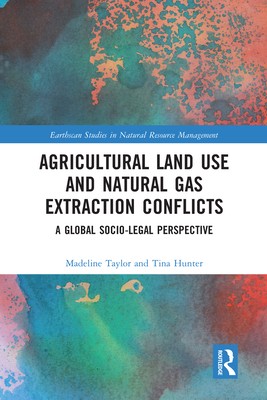
- We will send in 10–14 business days.
- Author: Madeline Taylor
- Publisher: Routledge
- ISBN-10: 0367582988
- ISBN-13: 9780367582982
- Format: 15.5 x 23.1 x 1.8 cm, minkšti viršeliai
- Language: English
- SAVE -10% with code: EXTRA
Agricultural Land Use and Natural Gas Extraction Conflicts (e-book) (used book) | bookbook.eu
Reviews
Description
Onshore unconventional gas operations, in most jurisdictions, operate on the legal principle that all activities during exploration and extraction are 'temporary' in nature. The concept that the onshore unconventional gas industry has a temporary effect on the land on which it operates creates a regulatory paradox. On one hand, unconventional gas activities create energy security, national wealth and a bourgeoning export industry. On the other, agricultural land and agriculturalists may be significantly disadvantaged by unconventional gas activities potentially producing permanent damage to non-renewable fertile soils and spoiling the underground water tables. Thus, threatening future food security and food sovereignty.
This book explores the socio-regulatory dimensions of coexistence between agricultural and onshore unconventional gas land uses in the jurisdictions with the highest concentration of proven unconventional gas reserves - Australia, Canada, the USA, the UK, France, Poland and China. In exploring the differing regulatory standpoints of unconventional gas land uses on productive farming land in the chosen jurisdictions, this book provides an original three-part categorisation of regulatory approaches addressing the coexistence of agricultural land and unconventional gas namely: adaptive management, precautionary and, finally, statism. It offers a timely and topical approach to socio-legal natural resource governance theory based on the participation, transparency and empowerment for agricultural landholders, examining how differing frameworks such as the collective bargaining framework can create equitable and sustainable contractual arrangements with unconventional gas companies.
EXTRA 10 % discount with code: EXTRA
The promotion ends in 21d.04:55:04
The discount code is valid when purchasing from 10 €. Discounts do not stack.
- Author: Madeline Taylor
- Publisher: Routledge
- ISBN-10: 0367582988
- ISBN-13: 9780367582982
- Format: 15.5 x 23.1 x 1.8 cm, minkšti viršeliai
- Language: English English
Onshore unconventional gas operations, in most jurisdictions, operate on the legal principle that all activities during exploration and extraction are 'temporary' in nature. The concept that the onshore unconventional gas industry has a temporary effect on the land on which it operates creates a regulatory paradox. On one hand, unconventional gas activities create energy security, national wealth and a bourgeoning export industry. On the other, agricultural land and agriculturalists may be significantly disadvantaged by unconventional gas activities potentially producing permanent damage to non-renewable fertile soils and spoiling the underground water tables. Thus, threatening future food security and food sovereignty.
This book explores the socio-regulatory dimensions of coexistence between agricultural and onshore unconventional gas land uses in the jurisdictions with the highest concentration of proven unconventional gas reserves - Australia, Canada, the USA, the UK, France, Poland and China. In exploring the differing regulatory standpoints of unconventional gas land uses on productive farming land in the chosen jurisdictions, this book provides an original three-part categorisation of regulatory approaches addressing the coexistence of agricultural land and unconventional gas namely: adaptive management, precautionary and, finally, statism. It offers a timely and topical approach to socio-legal natural resource governance theory based on the participation, transparency and empowerment for agricultural landholders, examining how differing frameworks such as the collective bargaining framework can create equitable and sustainable contractual arrangements with unconventional gas companies.


Reviews